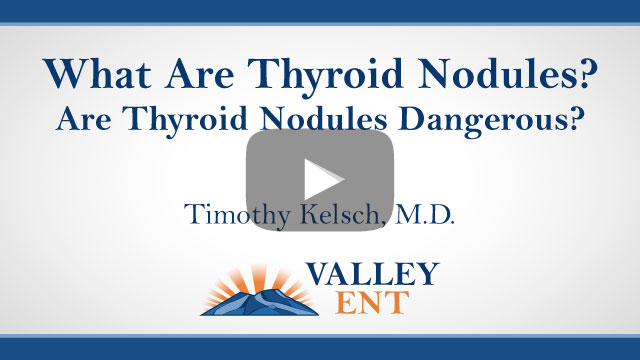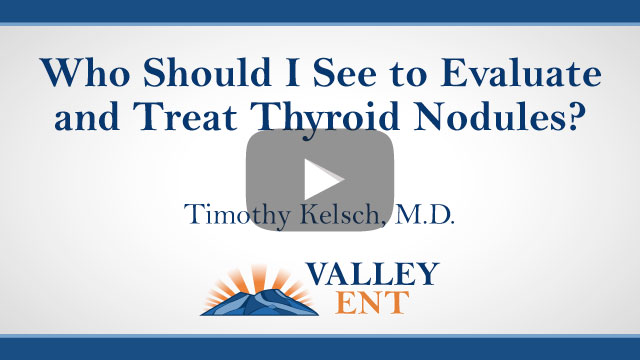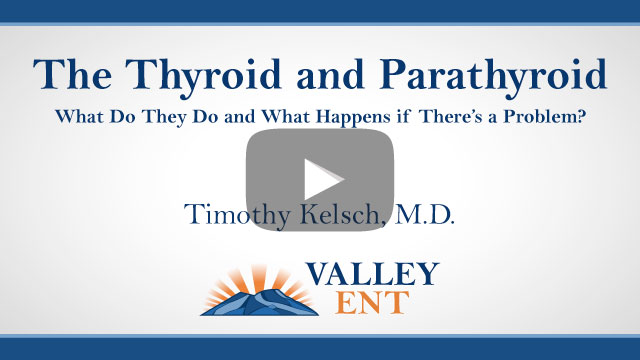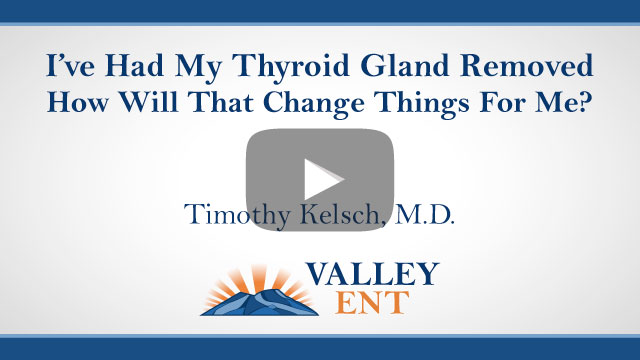Thyroid Nodules
Thyroid Nodules - About
Thyroid nodules are solid or fluid-filled lumps that form within your thyroid, a small gland located at the front of the neck, just above where your collarbones meet in the middle. The great majority of thyroid nodules aren't serious and don't cause symptoms. However, if the cells in the nodules are functioning and producing thyroid hormone on their own, the nodule may produce signs and symptoms of too much thyroid hormone (hyperthyroidism). Thyroid cancer accounts for only a small percentage of thyroid nodules.
You often won't know you have a thyroid nodule until your doctor discovers it during a routine medical exam. A thyroid nodule can occur in any part of the gland. Some nodules can be felt quite easily. Others can be hidden deep in the thyroid tissue or located very low in the gland, where they are difficult to feel. Some thyroid nodules, however, may become large enough to be visible or make it difficult to swallow.
Thyroid nodules may be single or multiple. A thyroid gland that contains multiple nodules is referred to as a multinodular goiter. If the nodule is filled with fluid or blood, it is called a thyroid cyst.
If the nodule produces thyroid hormone in an uncontrolled manner (without regarding the body's needs), the nodule is referred to as autonomous and may cause signs and symptoms of too much thyroid hormone, or hyperthyroidism. Less often, patients with a thyroid nodule may have too little thyroid hormone, or hypothyroidism.
For Surgery Fasting Guidelines, Medications Before Surgery and After Surgery
Information, please view our Patient Resources Section here.

Thyroid Nodules - Diagnosis
Thyroid nodules usually are discovered by the health care professional during routine physical examination of the neck. Occasionally, a patient may notice a nodule as a small lump in their neck. The doctor will take a detailed history, evaluating both past and present medical problems. If the patient is younger than 20 or older than 70 years, there is increased likelihood that a nodule is cancerous.
Initially, blood tests should be done to assess thyroid function. A physician may order an ultrasound examination of the thyroid to detect the number of nodules and their sizes, if a nodule is solid or cystic The ultrasound alone cannot determine whether a nodule is benign or cancerous.
Radionuclide scanning with safe radioactive chemicals is another imaging technique a physician may use to evaluate a thyroid nodule. The normal thyroid gland accumulates iodine from the blood and uses it to make thyroid hormones. Thus, when radioactive iodine is given by mouth or injection it accumulates in the thyroid and causes the gland to "light up" when imaged by a special nuclear camera. The rate of accumulation gives an indication of how the thyroid gland and any nodules are functioning. A "hot spot" appears if a part of the gland or a nodule is producing too much hormone. Non-functioning or hypo-functioning nodules appear as "cold spots" on scanning. A cold or non-functioning nodule carries a higher risk of cancer than a normal or hyper-functioning nodule. Cancerous nodules are more likely to be cold, because cancer cells are immature and don't accumulate the iodine as well as normal thyroid tissue. However, cold spots can also be caused by cysts.
Fine needle aspiration (FNA) of a nodule is a type of biopsy and the most common, direct way to determine what types of cells are present. Fine needle aspiration can be performed with ultrasound guidance. The needle is inserted into the thyroid or nodule to withdraw cells. Usually, several samples are taken to maximize the chance of detecting abnormal cells. These cells are examined microscopically by a pathologist to determine if cancer cells are present. The value of FNA depends upon the experience of the physician performing the FNA and the pathologist reading the specimen.
Thyroid Nodules - Treatment
Treatment depends on the type of thyroid nodule you have.
If a biopsy shows that you have a benign thyroid nodule, your doctor may suggest simply watching your condition, which usually means having a physical exam and thyroid function tests at regular intervals. You're also likely to have another biopsy if the nodule grows larger. If a benign thyroid nodule remains unchanged, you may never need treatment.
Thyroid hormone suppression therapy involves treats a benign nodule with a synthetic form of thyroid hormone taken as a pill. The additional thyroid hormone may signal the pituitary to produce less TSH, the hormone that stimulates the growth of thyroid tissue. However, at this time there's no clear evidence that the treatment consistently shrinks nodules or even that shrinking small, benign nodules is necessary.
Occasionally, a nodule that's clearly benign may require surgery, especially if it's so large that it makes it hard to breathe or swallow. Surgery is also considered for people with large multinodular goiters, particularly when the goiters constrict airways, the esophagus or blood vessels. Nodules diagnosed as indeterminate or suspicious by a biopsy also need surgical removal, so they can be examined for signs of cancer.
If a thyroid nodule is producing thyroid hormones, overloading your thyroid gland's normal hormone production levels, your doctor may recommend treating you for hyperthyroidism. Doctors often use radioactive iodine. which is taken as a capsule or in liquid form, is absorbed by your thyroid gland, and causes the nodules to shrink and signs and symptoms of hyperthyroidism to subside, usually within two to three months.
In some cases, your doctor may recommend an anti-thyroid medication to reduce symptoms of hyperthyroidism. Treatment is generally long-term and can have serious side effects on your liver, so it's important to discuss the treatment's risks and benefits with your doctor.
If treatment with radioactive iodine or anti-thyroid medications isn't an option, you may be a candidate for surgery to remove your thyroid gland
Treatment for a nodule that's cancerous usually involves surgery a procedure called near-total thyroidectomy. Risks of thyroid surgery include damage to the nerve that controls your vocal cords (laryngeal nerve) and damage to your parathyroid glands - four tiny glands located on the back of your thyroid gland that help control the level of calcium in your blood. After thyroidectomy, you'll need lifelong treatment with thyroid hormone supplement to supply your body with normal amounts of thyroid hormone.
Valley ENT has 22 locations across the Phoenix, Scottsdale, East Valley, West Valley, and Tucson areas to serve you better.



